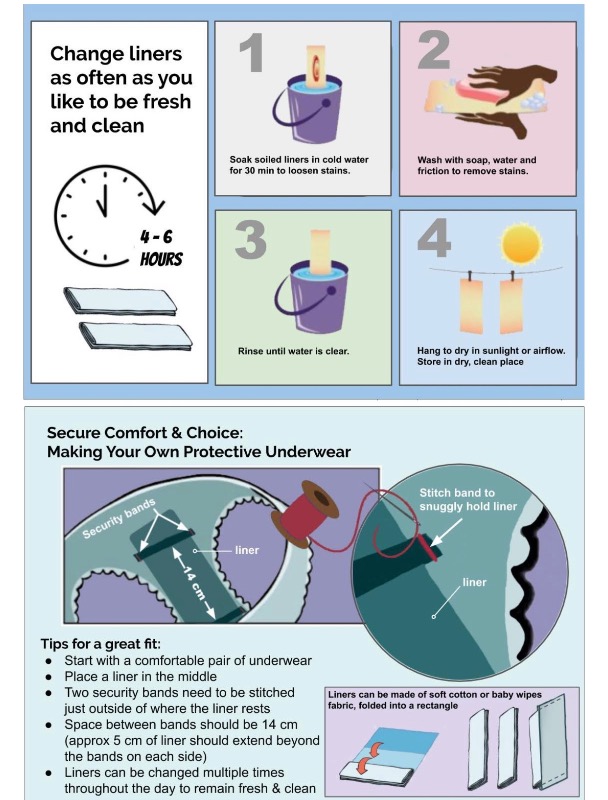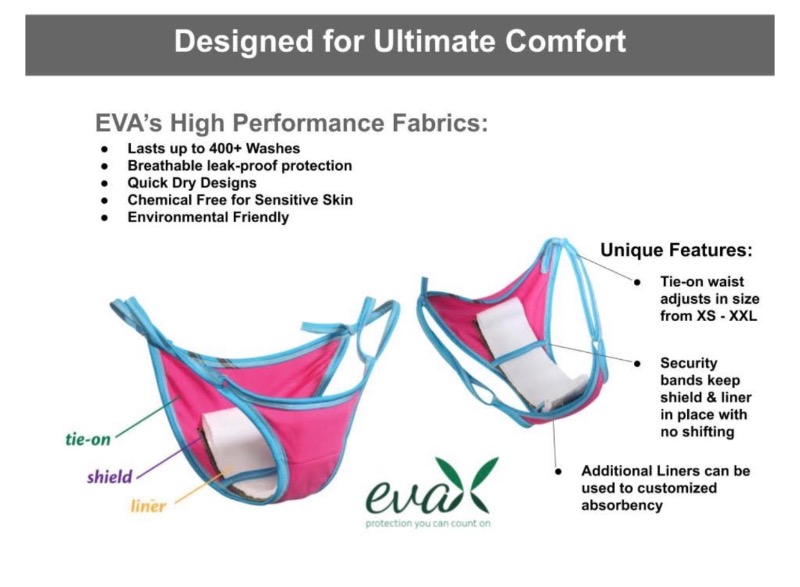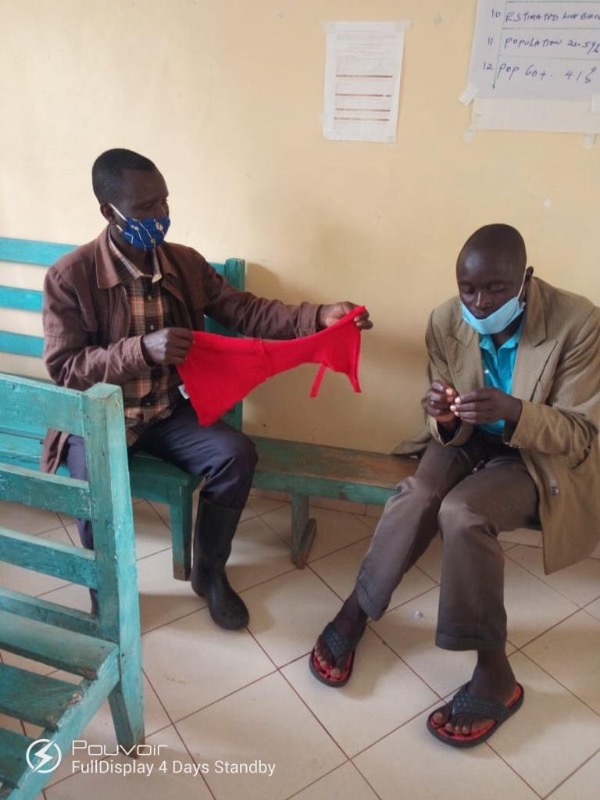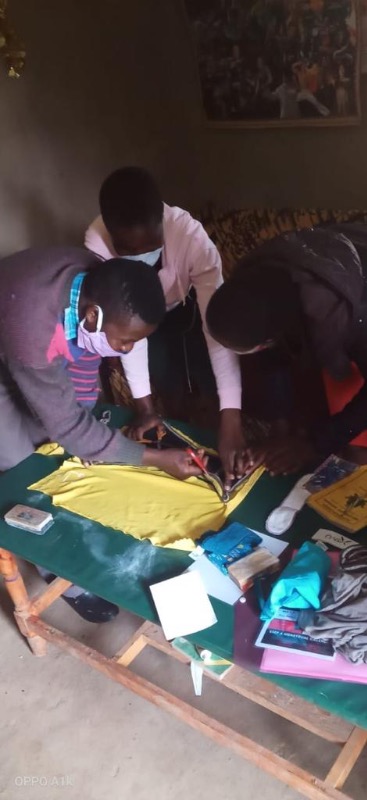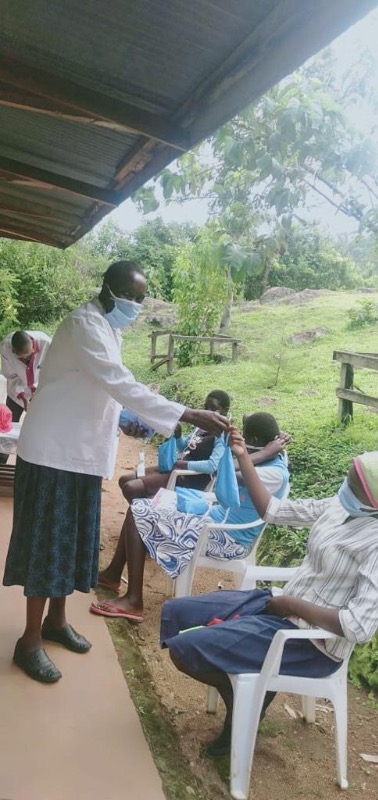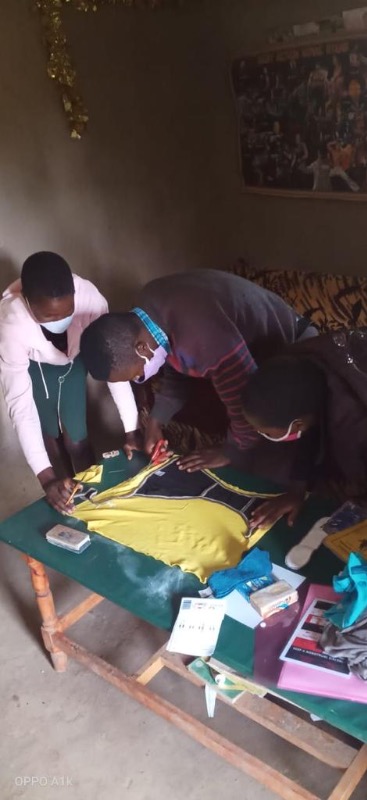- Forum
- categories
- Equity, inclusion and sanitation workers
- Menstrual health and hygiene (MHH) or Menstrual hygiene management (MHM)
- Kenya Ministry of Health launches Menstrual Hygiene Strategy and Policy 2019-2024
Kenya Ministry of Health launches Menstrual Hygiene Strategy and Policy 2019-2024
5569 views
Re: Kenya Ministry of Health launches Menstrual Hygiene Strategy and Policy 2019-2024
“Rachel, I cant help but think that your concerns are related to this: Last year, #MyAlwaysExperience went viral on Twitter. Kenyan women broke their silence, openly discussing the painful, uncomfortable experiences from using a particular brand of pads. They all shared similar symptoms like itching, rashes and inflammation. Where they had thought their bodies were the problem, it became clear that this was in fact not the case. Following this, The Kenya Bureau of Standards (Kebs) initiated an investigation into this particular brand following consumer complaints. The move by the standards agency could have resulted in the withdrawal of the products if they were found to be sub-standard In line with the concerns expressed on social media, Kebs launched investigations that include extensive market surveillance and testing of these products to ascertain if there exists any breach of quality standards. The outcomes of analysis determined the next course of action, including market withdrawal of any substandard products.
Chaiwe”
Interestingly, Those substandard disposable products that were complained about last year ... completely comply with the existing KEBs disposable Product standards. There is nothing in the standards that prevents the use of toxic chemicals.
It is an extremely complicated issue ... and the only silver lining is that the women of Kenya spoke up.
Any product standards can only go so far ... ultimately it is in the use of the product by the end user, if one is truely concerned about the actual “safety” of a product. True ... overly toxic laden products ... well they are just that ... toxic ... but even a benign “non-toxic” disposable can become “unsafe” if used improperly. If worn too long ... etc. In the same way, a reusable can be misused and not cleaned adequately.
Proper education for use and care of any product ... Is a very critical and essential piece of the solution.
The most scary thing about Reusables is that they are not “Fast moving Goods/consumables” they don’t make the big players money. It is not in their best interest to promote sustainable Menstruration.
To be honest, I can understand some of the tension of Government bodies relying on Big business to support their other efforts ... grants, incentives, awards of money in other areas ... that are important too ... but this funding can come with strings.
In 2015 I was part of several KEBS meetings about reusables ... the entire committee was in favor ... but the heavyweight that was backed by money was downright angry and rude to me ... the other doctors and others on that committee could see the validity and there was positive forward momentum ... the very next meeting was a different story.
The back story is ugly and I am not here to air dirty laundry that is not mine. There are some incredible stakeholders within Kenya MOH of health ... that have fought hard and long to make Menstrual health be heard ... and there were some powerful individuals withIn various offices that are strongly opposed. ... and thus the cycle continues for Kenya who has on and off been developing a reusable product standard since 1985. (You can check back the facts ... that is when the first efforts began to Reusables).
At the end of the day ... speaking frankly, it is about profits not people. The same wars were fought in the 80’s and 90’s in the west for cloth baby diapers. Marketing and Money are powerful forces. (I only speak of this as I was involved in manufacturing cloth baby diapers for a major US brand that was instrumental in protecting consumers (and baby bottoms) from toxic products. The difference between the US and Kenya, is that the consumers had access to information and had money to lobby.
The sad fact of the matter for Kenya and other African countries, is that the girls and women that are losing and are at most risk, don’t even have a chance to know of the great sustainable options that will give them dignity and comfort during their menstruation. Who will speak for them? Who will be the “dripping tap of persistence” ... Who will lobby to provide them sustainable and affordable choice?
Somehow, someway ... that voice will have to come from within. From Kenyan women ... they are smart and they are strong. There are those in the hallways of bureaucracy, who don’t think so ... women are weak, not intelligent, incapable of planning to haul extra water so she can be clean. I have been to the trenches, I have talked to those same women ... they are strong, smart and resilient... even in the most water scarce regions, when shown well designed products (commercial as well has handmade) the women’s eyes light up with hope and possibility.
I am praying for Kenya. That the voice of women can be unleashed.
As a designer of products, I listen to what the women actually want ... For me the voice I am most interested in listen to is my forgotten sister ... in the worst possible of conditions. I want to help her. She is not a stat ... she has a name , a dream and a destiny.
I am so appreciate of the champions that are fighting for her. Thank you to many on this forum and in many technical committees... faithful stakeholders who do live and fight on those bureaucratic hallways. I salute your efforts. Don’t give up.
Someday, a product standard will prevail and come ... just like the MHM National Policy was birthed. In that day ... the silent illegal ban that has been imposed on Reusables from entering Kenya will be lifted., and once again we can support your efforts with products that allow women to be fresh and clean anytime they want.
Until that day, we are doubling down our efforts in education, teaching women how they can easily “knock off our product designs” Since we can’t import them in and They make their own. The pictures of her masked smiling face (during COVID) while maintaining proper social distance protocols, brought great joy to us on the sidelines. Yes Kenya, your women are powerful , resilient and resourceful.
This email address is being protected from spambots. You need JavaScript enabled to view it. Twitter: @EVAWearOfficial
Attachments:
-
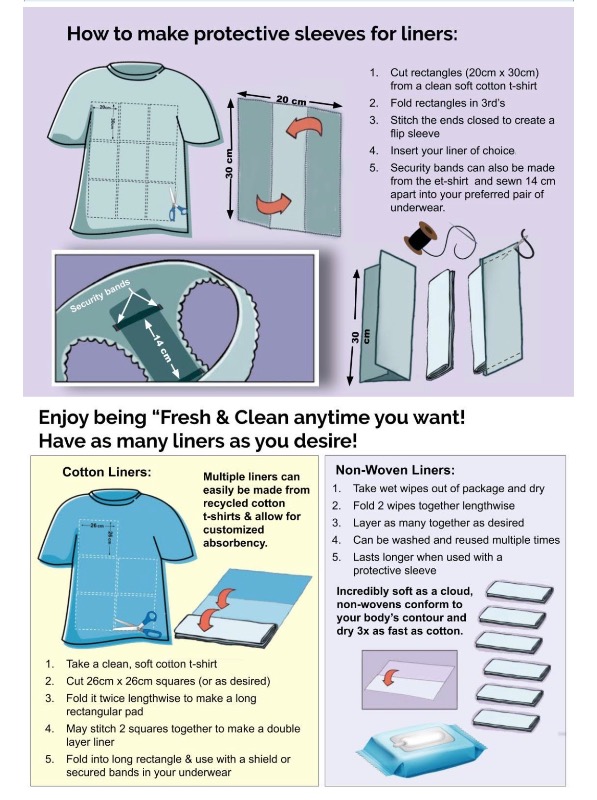 C3E92170-E...4F0.jpeg
(Filesize: 140KB)
C3E92170-E...4F0.jpeg
(Filesize: 140KB)
Please Log in to join the conversation.
You need to login to reply- Chaiwe
-

- Moderator
- Innovation enthusiast and Knowledge Management Expert in WASH and Climate Change while cross-cutting Youth and Gender Issues. CEO of CaDev_Capacity Development (An African Social Enterprise)
Less- Posts: 336
- Karma: 8
- Likes received: 116
Re: Kenya Ministry of Health launches Menstrual Hygiene Strategy and Policy 2019-2024
I say Kenya must be commended for launching the Menstrual Health Strategy and Policy. It is hoped that the purpose of the Strategy to provide a vehicle that allows for transformation of Menstrual Hygiene Management in Kenya is met.
Kenya is recognised as one of the countries that is making progress in policy, processes, and practices relating to Menstrual Health Management (MHM). It is an example in providing key lessons to other sub-Saharan countries that would like to improve MHM as a crucial aspect of the SDGs and related efforts.
Meanwhile, a policy document does not magically change the situation, . This will require the allocation of resources, provision of standards ( as you mentioned Rachel), guidelines, protocols and indicators that can be monitored and through which duty bearers can be held accountable. The Ministry of Education in Kenya sets standards for sanitation facilities in schools in the country. Female facilities must include a bathroom for MHM. These standards were endorsed by the Quality Assurance and Standards (QAS) Department of MOH and are being applied in all schools, but again to echo your point Rachel, product standards are a very necessary next step.
Rachel, I cant help but think that your concerns are related to this: Last year, #MyAlwaysExperience went viral on Twitter. Kenyan women broke their silence, openly discussing the painful, uncomfortable experiences from using a particular brand of pads. They all shared similar symptoms like itching, rashes and inflammation. Where they had thought their bodies were the problem, it became clear that this was in fact not the case. Following this, The Kenya Bureau of Standards (Kebs) initiated an investigation into this particular brand following consumer complaints. The move by the standards agency could have resulted in the withdrawal of the products if they were found to be sub-standard In line with the concerns expressed on social media, Kebs launched investigations that include extensive market surveillance and testing of these products to ascertain if there exists any breach of quality standards. The outcomes of analysis determined the next course of action, including market withdrawal of any substandard products.
Chaiwe
Skat Foundation (With financial support by GIZ and SIRWASH up to November 2023)
Chaiwe Mushauko-Sanderse BSc. NRM, MPH
Independent consultant located in Lusaka, Zambia
Emails: This email address is being protected from spambots. You need JavaScript enabled to view it., This email address is being protected from spambots. You need JavaScript enabled to view it.
LinkedIn: www.linkedin.com/in/chaiwe-mushauko-sanderse-21709129/
Twitter: @ChaiweSanderse
Please Log in to join the conversation.
You need to login to replyRe: Kenya Ministry of Health launches Menstrual Hygiene Strategy and Policy 2019-2024
GIZ Sustainable Sanitation Programme
Policy Advisor in Bonn, Germany
Deutsche Gesellschaft für Internationale Zusammenarbeit (GIZ) GmbH
E This email address is being protected from spambots. You need JavaScript enabled to view it.
Please Log in to join the conversation.
You need to login to replyRe: Kenya Ministry of Health launches Menstrual Hygiene Strategy and Policy 2019-2024
Really? So is that the narrative they are using to excuse all of the drama of the last few years. But i do have hope that true leaders and advocates will arise. If you sense some bitterness in my words, there is ... as unfortunately 25,000 girls paid the price for the dance between MOH and KEBs. I highly doubt there was any malicious companies that were trying to exploit girls as "testing kits". ... if the truth were truly laid bare, it is more likely that companies concerned with their bottom line of profit, were trying to protect their market share and protect their government tenders to purchase their conventional disposable products from the increasing availability of more sustainable products. Products that were legally allowed import for over 5 years previous. Suddenly overnight certain papers were with-held so that due process could not be followed.
Without naming names ... at the highest level, officials told me that their hands were tied and it was the other party who was preventing forward motion. It was a gruelling 8 months of legal appeal for justice to be done ... and the justice was only a 'one-off' for my container, as KEBs could not deny they had officially issued my proper papers to import, as my case slipped through their cracks of internal memos to do the opposite. Their absolute refusal to refer to existing Ugandan project standards was extremely disheartening and just made it clear how politically charged this was ... .
Let's hope the Kenyan MOH MH Strategy 2019-2024 does not collect dust, but quickly and with a strong hand encourages a Kenyan product standard to be published ... or in its absence to abide by the Ugandan standard or EAC standard ... May the political pressure to do the right thing prevail. May the silent and illegal ban of resuables be lifted. No due process has been legislated to withhold PVOC import papers ... but that is the reality ... until this is solved NO COMMERCIAL REUSEABLES are allowed into Kenya.
This email address is being protected from spambots. You need JavaScript enabled to view it. Twitter: @EVAWearOfficial
Please Log in to join the conversation.
You need to login to replyKenya Ministry of Health launches Menstrual Hygiene Strategy and Policy 2019-2024
The world on Thursday celebrated Menstrual Hygiene Day, a day dedicated to raising awareness about menstrual hygiene. On Thursday, the Ministry of Helath launched the Menstrual Hygiene policy 2019-24.
"This policy is meant to create an enabling environment for implementation of menstrual hygiene and management interventions in Kenya. It will also ensure women and girls have access to safe and hygienic products," said the Cabinet Secretary Mr Mutahi Kagwe.
More information can ebe found in this new article: www.the-star.co.ke/news/2020-05-28-healt...rual-hygiene-policy/
Best regards, Doreen.
GIZ Sustainable Sanitation Programme
Policy Advisor in Bonn, Germany
Deutsche Gesellschaft für Internationale Zusammenarbeit (GIZ) GmbH
E This email address is being protected from spambots. You need JavaScript enabled to view it.
Please Log in to join the conversation.
You need to login to reply- Forum
- categories
- Equity, inclusion and sanitation workers
- Menstrual health and hygiene (MHH) or Menstrual hygiene management (MHM)
- Kenya Ministry of Health launches Menstrual Hygiene Strategy and Policy 2019-2024








